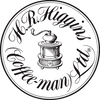On 16th September 1944, Harold Rees Higgins first opened the doors to the H.R. Higgins shop with the sole aim to supply coffee to businesses and individuals affected by the war. A result of the humblest of beginnings, H.R. Higgins is now proudly celebrating the shop’s 75th anniversary and with this lies the opportunity to reflect on the past three quarters of a century.
The everyday commuter or passer-by might miss the unobtrusive London coffee shop, seduced instead by the bolder glass fronted Mayfair premises with their exquisite and daring window displays. Those with a more inquisitive eye will however spot a bicycle with a basket full of flowers, and glints of gold, brass, and dark wood interiors that mark H.R. Higgins (Coffee-man) Ltd. Upon walking through the door, the shop is seductively dark and enigmatic, and the intoxicating smell of coffee and tea intrigues and invites.
This wasn't always the way. Let’s rewind 75 years. On Wednesday 31st March 1942, Harold Higgins noted in his diary that he had ceased being an employee of The Kenya Coffee Company (better know these days as Kenco).
He was then offered a small attic room on 43 South Molton Street in Mayfair, an address that was occupied at the time by a Miss Fox and a Miss Jenkins, who were local bakers. The room was up 70 stairs and the rent was £5 a month including rates.
It was here Harold started H.R. Higgins (and therefore was subsequently known as Coffee-Man), a wholesale only business, possibly because nobody in their right mind would climb the 70 stairs to the little back room to buy directly!
The business boomed, and in 1944 Harold took his roaster back down the 70 stairs to his first shop at 42 South Molton Street. It is thought Harold attempted to acquire these premises over a long period, with several thwarted applications due to the front of the shop being repeatedly blown out during bombing raids. Despite these setbacks, H.R. Higgins was born. This humbled ground floor shop and basement was decorated with rich mahogany and exquisitely designed traditional weighing scales bought at auction. On his first day of trading, Harold served eleven customers and made a rather remarkable £2 and thruppence.









